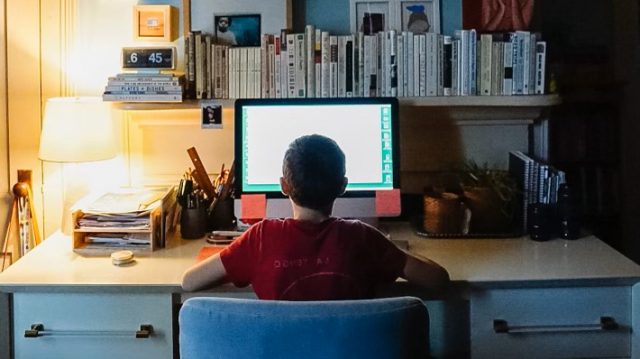
A grant from the W.K. Kellogg Foundation is allowing the university’s Clinic for Outreach and Personal Enrichment to expand online counseling services to students in Desoto, Sunflower and Tunica counties and the municipalities of Jackson, Rosedale and Greenwood. The program helps Mississippi families obtain quality counseling for students without the time constraints and costs of in-person appointments. Photo by Erin Austen Abbott
OXFORD, Miss. – The University of Mississippi‘s Clinic for Outreach and Personal Enrichment is expanding accessible, online counseling services to students across Mississippi, thanks to a new grant from the W.K. Kellogg Foundation.
The grant, called “Mental Health Counselors on Campus,” has allowed COPE to expand services once limited to Lafayette County to communities where providers and access are scarce. New partner communities include Desoto, Sunflower and Tunica counties and the municipalities of Jackson, Rosedale and Greenwood. The clinic plans to include Warren County later this year.
Students can access services with a tablet, computer or cellphone.
Established in 2015, COPE offers the campus and community a variety of mental health services for children and adults. The clinic also trains master’s and doctoral students in the university’s counselor education program.
The program’s initial pilot telemental health program began in 2020 for Lafayette County students in an effort to minimize the COVID-19 pandemic’s disruption to therapeutic services. In 2021, those efforts were bolstered by the Governor’s Emergency Education Response Fund.
The pilot program’s success put a spotlight on the challenges of traditional, in-person health care, such as time and transportation.
“Most parents have jobs that don’t allow for a two-hour intermission to cart kids to therapy,” said Rick Balkin, doctoral program coordinator for the Department of Leadership and Counselor Education. “COPE meets students where they are, in both in-school and after-school settings.”
“The free mental health care COPE provides allows us to catch those who might otherwise fall through the cracks.”
In Mississippi, the need for accessible services is critical. Mississippi youth experience rates of trauma – broadly defined to include abuse, neglect, mental illness, substance abuse or parental divorce – at rates higher than the national average. The state ranks 42nd on this measure, according to America’s Health Rankings.
A 2023 study from Kids Count reports that 28% of Mississippi children were diagnosed with an emotional, behavioral or developmental disorder – 5 percentage points higher than the national average – a number that has only increased since the COVID-19 pandemic.
Compounding the issue, Mississippi is one of the most uninsured states, and Medicaid is the single largest source of coverage for children. At the same time, few providers accept Medicaid to cover the cost of care, according to a 2022 report from the Children’s Foundation of Mississippi.
Schools can sometimes minimize the gap in youth access to care; however, in 2022, only 140 school psychologists were employed in the state, approximately 1.7 per Mississippi county, according to the U.S. Bureau of Labor Statistics.
“To support youth mental health in a Mississippi context, ‘high-need’ schools need attention,” Balkin said.
“When youth mental health goes unsupported, we see a rise in teen suicides, a rise in antisocial behaviors, a spike in the school-to-prison pipeline and an entrenched cycle of poverty. When a child’s holistic needs aren’t met, their educational needs cannot be met.”
Since August 2022, COPE has facilitated more than 2,000 hours of free counseling for youth – some more than 150 miles away – saving those students and their families more than $200,000.
Though the pandemic and rising rates of trauma influenced the pivot to telemental health, COPE’s telemental health counseling is not just a responsive service, Balkin said. COPE counselors also emphasize career and college readiness, helping youth to determine and reach their post-secondary goals.
It also provides Ole Miss students with diversified training in online competencies and experience working with clients from diverse racial and socioeconomic backgrounds.
Students in some areas experience more trauma, while others may require more targeted school support, said Rebecca Boyd, a clinical mental health counseling master’s student from Vicksburg.
“Providing counseling services to kids in diverse regions has helped me to learn how to adapt my skills to the specific needs of children and adolescents from different areas,” Boyd said.
Across the U.S., the telemental health care sector continues to diversify and grow. According to a Grand View Research report, market revenue for the sector is projected to grow at a compound annual growth rate of 24% between 2023 and 2030, creating more job opportunities for counselors with requisite skills.
“Our field is constantly evolving, and counselors must keep up with the new services offered,” Boyd said. “Understanding what it’s like to provide telemental health services and learning best practices benefits my ability to market myself as I search for a job.”